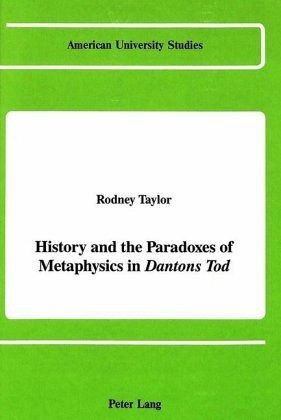Nicht lieferbar

History and the Paradoxes of Metaphysics in "Dantons Tod"
Versandkostenfrei!
Nicht lieferbar
History and the Paradoxes of Metaphysics in Dantons Tod is the first in-depth analysis exploring the dynamic relationship between Hegelian metaphysics and Georg Büchner's literary masterpiece. This study illuminates the fascinating paradoxes emerging from Büchner's portrayal of the collision of historical reality with the monumental concept of freedom developed in the monistic idealism of Hegel. It also brings to light much-neglected interconnections between Büchner's Hegelian reading of Spinoza and his theories on nature and history.



